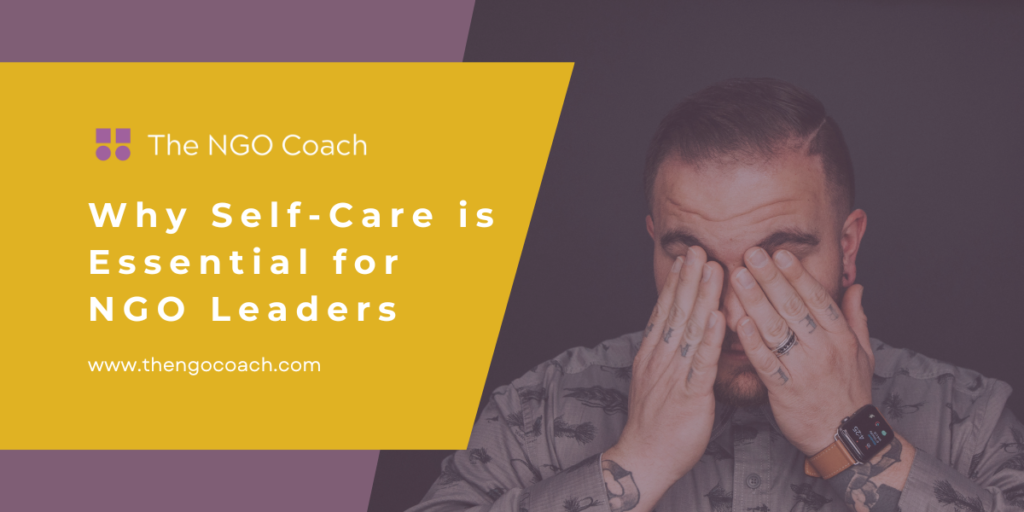During my many years working across nonprofits, I’ve seen the incredible passion, dedication, and hard work NGO leaders pour into their missions and causes. At the same time, I’ve seen how easy it can be for these same leaders to neglect their personal and professional well-being while constantly juggling funding shortages, governance challenges, and resource constraints.
When you’re running on empty, you’re not just short-changing yourself—you’re risking the very mission you’re passionate about. Trust me, your well-being is THE FOUNDATION for your nonprofit’s success. Prioritising your professional development and self-care is not just a luxury—it’s an essential component of your leadership journey.
Here are the ‘5 Whys’ you should be receiving professional development as an NGO leader:
1. Staying Ahead of the Curve
Nonprofits are constantly evolving, with new challenges and opportunities always popping up. Whether it’s COVID, natural disasters, weather events, funding cuts, or government changes, the past few years have been a whirlwind of constant change. Professional development is vital to help you stay up-to-date with the latest changes, trends, best practices, and innovations. This knowledge helps you navigate your role confidentially and ensure your mission remains strategically positioned within the wider political, social, environmental, and cultural systems.
2. Growing Your Leadership Skills
Leadership is not a fixed destination, but an ongoing journey of growth and development. Whether it’s through workshops, courses, or coaching and mentoring, professional development provides the opportunity for you to learn and enhance your skills. It empowers you to become a more effective leader.
In this rapidly changing world, where many NGO leaders have risen through the ranks without formal training, ongoing leadership development is vital. You may have had limited training about management and leadership before you took on your role, but now that you’re in it, its important to introduce professional development to help your leadership growth.
3. Building a Supportive Network
Building a supportive network of other NGO leaders is vital. I’ve written about this before. Professional development programmes and courses automatically introduce you to others on the same leadership journey. This can lead to future collaborations or partnerships and reduce those feelings of isolation often prevalent in NGO leaders. Remember, you’re not alone on this journey! Reaching out and connecting with others will make a huge difference for you personally.
4. Prioritising Self-Care
As we all know—leading an NGO can be exhausting! Professional development offers the opportunity not just to learn but also to implement components of self-care. Learning how to manage daily stressors better, improving your work-life balance, preventing burnout—these are all core to your success as an NGO leader.
Professional development often includes self-care components, teaching strategies to manage stress, maintain work-life balance, and prevent burnout. Prioritising your well-being ensures you have the energy and resilience to continue making a difference. I’m going to keep saying this—your well-being is the foundation for your nonprofit’s success. You can’t RUN ON EMPTY, and you need to prioritise nurturing yourself to keep nurturing others.
5. Benefits For Your Organisation
When your organisation invests in your growth, it also reaps the rewards: improved leadership skills, better decision-making, increased motivation, feeling valued, better mental and physical life balance, happier kaimahi / teams…the list goes on. It’s important to remember that by caring for yourself, you’re also caring for your kaimahi / team, your organisation, and the community you serve together. Without that professional investment, you’ll run out of energy to keep going. No business or government executive ever goes without a professional development budget!
How to Make It Work
As an NGO leader, you put the budget together. Have you built in professional development monies for you and your team this financial year? If not, why not? Professional development must be one of the first priorities for you and your tangata / people, not the last. This is a core component of being a good employer.
Have you spoken to your Board Chair/Co-Chairs about professional development for you as an essential component of your role? I wish all nonprofit boards were offering development as part of the salary package for their NGO leaders. Frustratingly, I’ve found this to rarely be the case. Instead, the manager usually has to ask the board themselves for this to be prioritised. This is very back-to-front and shows that many boards do not fully understand their legal obligations. Employers must provide a safe work environment, including safety from work-related stress and fatigue.
How much to budget for? There is no fixed percentage, but I recommend a starting point of 2% of your salary. Build that into your budget first, then budget in for your staff. These monies should come before funding for governance training. As employees, legislation lays out how you must be cared for. The organisation will benefit more from offering professional development to its leader and staff than its governance board. This is not to say that you should not train your board, but that’s a secondary priority in budgetary terms.
Take that step today and invest in your personal and professional development and growth. Your future self—and your organisation—will thank you!

